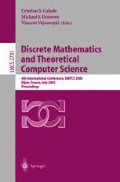Abstract
Two philosophical applications of the concept of program-size complexity are discussed. First, we consider the light program-size complexity sheds on whether mathematics is invented or discovered, i.e., is empirical or is a priori. Second, we propose that the notion of algorithmic independence sheds light on the question of being and how the world of our experience can be partitioned into separate entities.
Access this chapter
Tax calculation will be finalised at checkout
Purchases are for personal use only
Preview
Unable to display preview. Download preview PDF.
References
O. Postel-Vinay, “L’Univers est-il un calculateur?” [Is the universe a calculator?], La Recherche, no. 360, January 2003, pp. 33–44.
S. Wolfram, A New Kind of Science, Wolfram Media, 2002.
G.W. Leibniz, Discours de métaphysique, Gallimard, 1995.
G.W. Leibniz, Philosophical Essays, Hackett, 1989.
H. Weyl, The Open World, Yale University Press, 1932, Ox Bow Press, 1989.
B. Magee, Confessions of a Philosopher, Modern Library, 1999.
J. R. Brown, Philosophy of Mathematics, Routledge, 1999.
G.J. Chaitin, “Paradoxes of randomness,” Complexity, vol. 7, no. 5, pp. 14–21, 2002.
G.J. Chaitin, “Meta-mathematics and the foundations of mathematics,” Bulletin EATCS, vol. 77, pp. 167–179, 2002.
G.J. Chaitin, “On the intelligibility of the universe and the notions of simplicity, complexity and irreducibility,” http://arxiv.org/abs/math.HO/0210035, 2002.
P.A. Schilpp, The Philosophy of Bertrand Russell, Open Court, 1944.
A. Einstein, Ideas and Opinions, Crown, 1954, Modern Library, 1994.
A. Einstein, Autobiographical Notes, Open Court, 1979.
K. Gödel, Collected Works, vols. 1–5, Oxford University Press, 1986–2003.
Kurt Gödel: Wahrheit & Beweisbarkeit [truth and provability], vols. 1–2, öbv & hpt, 2002.
T. Tymoczko, New Directions in the Philosophy of Mathematics, Princeton University Press, 1998.
G.J. Chaitin, Exploring Randomness, Springer-Verlag, 2001. Chaitin’ papers are available at http://cs.auckland.ac.nz/CDMTCS/chaitin.
Author information
Authors and Affiliations
Editor information
Editors and Affiliations
Rights and permissions
Copyright information
© 2003 Springer-Verlag Berlin Heidelberg
About this paper
Cite this paper
Chaitin, G. (2003). Two Philosophical Applications of Algorithmic Information Theory. In: Calude, C.S., Dinneen, M.J., Vajnovszki, V. (eds) Discrete Mathematics and Theoretical Computer Science. DMTCS 2003. Lecture Notes in Computer Science, vol 2731. Springer, Berlin, Heidelberg. https://doi.org/10.1007/3-540-45066-1_1
Download citation
DOI: https://doi.org/10.1007/3-540-45066-1_1
Published:
Publisher Name: Springer, Berlin, Heidelberg
Print ISBN: 978-3-540-40505-4
Online ISBN: 978-3-540-45066-5
eBook Packages: Springer Book Archive

